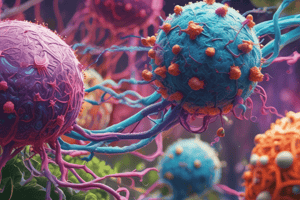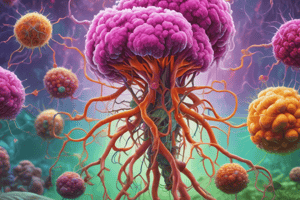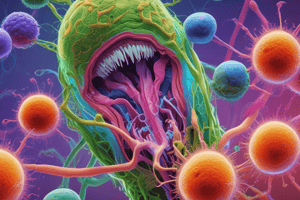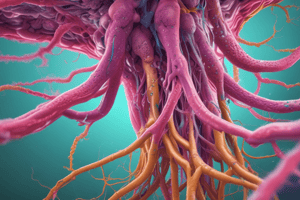Podcast
Questions and Answers
What is the primary role of fever in the body's immune response?
What is the primary role of fever in the body's immune response?
Fever helps to inhibit the growth of pathogens during an infection.
How does innate immunity differ from adaptive immunity?
How does innate immunity differ from adaptive immunity?
Innate immunity is non-specific and provides rapid defense, while adaptive immunity is specific and develops a slower, targeted response.
Describe the role of lymph nodes in the immune system.
Describe the role of lymph nodes in the immune system.
Lymph nodes filter pathogens and activate lymphocytes to mount an immune response.
What are autoimmune diseases, and how do they affect the body?
What are autoimmune diseases, and how do they affect the body?
Explain how exercise influences immune system function.
Explain how exercise influences immune system function.
What measures can individuals take to maintain a healthy immune system?
What measures can individuals take to maintain a healthy immune system?
What is the significance of immune surveillance in the body?
What is the significance of immune surveillance in the body?
How do allergies relate to the immune system?
How do allergies relate to the immune system?
What is the primary function of the lymphatic system?
What is the primary function of the lymphatic system?
Name two key components of the immune system and their functions.
Name two key components of the immune system and their functions.
How do lymph nodes contribute to the immune response?
How do lymph nodes contribute to the immune response?
What role does the spleen play in the lymphatic system?
What role does the spleen play in the lymphatic system?
Explain the term 'antigen' in the context of the immune system.
Explain the term 'antigen' in the context of the immune system.
What is the significance of the thymus in the immune system?
What is the significance of the thymus in the immune system?
Describe the role of macrophages in the immune response.
Describe the role of macrophages in the immune response.
What is lymph and how is it formed?
What is lymph and how is it formed?
Flashcards
What is the Lymphatic System?
What is the Lymphatic System?
A network of vessels, tissues, and organs that collect and filter lymph, a fluid containing white blood cells.
What is lymph?
What is lymph?
A clear fluid that circulates through lymphatic vessels, derived from interstitial fluid, and ultimately returns to the bloodstream.
What are lymph nodes?
What are lymph nodes?
Small, bean-shaped structures along lymphatic vessels that filter lymph and house lymphocytes.
What is the spleen?
What is the spleen?
Signup and view all the flashcards
What are white blood cells (leukocytes)?
What are white blood cells (leukocytes)?
Signup and view all the flashcards
What are antibodies (immunoglobulins)?
What are antibodies (immunoglobulins)?
Signup and view all the flashcards
What are antigens?
What are antigens?
Signup and view all the flashcards
What is the complement system?
What is the complement system?
Signup and view all the flashcards
Fever
Fever
Signup and view all the flashcards
Innate Immunity
Innate Immunity
Signup and view all the flashcards
Adaptive Immunity
Adaptive Immunity
Signup and view all the flashcards
Defense Against Pathogens
Defense Against Pathogens
Signup and view all the flashcards
Immune Surveillance
Immune Surveillance
Signup and view all the flashcards
Regulation of Immune Response
Regulation of Immune Response
Signup and view all the flashcards
Lymph Nodes and Immune Response
Lymph Nodes and Immune Response
Signup and view all the flashcards
Immunodeficiencies
Immunodeficiencies
Signup and view all the flashcards
Study Notes
Overview of the Immune and Lymphatic Systems
- The immune and lymphatic systems work together to protect the body from harmful substances and pathogens.
- The lymphatic system is a network of vessels, tissues, and organs that collect and filter lymph (a fluid containing white blood cells).
- The immune system is a complex network of cells, tissues, and organs that recognize and destroy foreign invaders (pathogens).
- Both systems are critical for maintaining health and resisting disease.
Lymphatic System Components
- Lymphatic Vessels: A network of thin-walled vessels that carry lymph throughout the body.
- Lymph Nodes: Small, bean-shaped structures located along lymphatic vessels; they filter lymph and house lymphocytes (white blood cells important for immunity).
- Spleen: A large lymphatic organ located in the upper left quadrant of the abdomen; filters blood, stores blood cells, and initiates immune responses.
- Thymus: Located in the chest; important for the development of T lymphocytes (a type of white blood cell).
- Tonsils and Adenoids: Lymphoid tissues located in the throat; involved in immune responses to pathogens entering the respiratory passages.
- Bone Marrow: Site of production for all blood cells, including lymphocytes.
Lymph Circulation
- Lymph is a clear fluid that circulates through lymphatic vessels.
- Lymph is derived from interstitial fluid, the fluid in the spaces between cells.
- Lymph ultimately returns to the bloodstream.
Immune System Components
- White Blood Cells (Leukocytes): A diverse group of cells that fight infection. Examples include:
- Neutrophils: Phagocytic cells that engulf and destroy pathogens.
- Lymphocytes: A key type of white blood cell that includes B cells and T cells, crucial for adaptive immunity.
- Macrophages: Large phagocytic cells that engulf and destroy pathogens and cellular debris.
- Dendritic Cells: Antigen-presenting cells that play a crucial role in initiating adaptive immune responses.
- Antibodies (Immunoglobulins): Proteins produced by B cells that bind to specific antigens (foreign substances).
- Antigens: Molecules that trigger an immune response.
- Complement System: A group of proteins that enhance the ability of antibodies and phagocytic cells to destroy pathogens.
- Inflammation: A localized response to injury or infection characterized by redness, swelling, heat, and pain.
- Fever: A systemic response to infection that helps to inhibit the growth of pathogens.
Innate vs. Adaptive Immunity
- Innate Immunity: The body's non-specific, rapid first line of defense against pathogens. This includes physical barriers (skin, mucous membranes), phagocytic cells (neutrophils, macrophages), and the inflammatory response.
- Adaptive Immunity: A specific and slower response to particular pathogens. This involves lymphocytes, antibodies, and memory cells, allowing the body to mount a tailored response upon subsequent encounters with the same pathogen.
Immune System Functions
- Defense Against Pathogens: The immune system recognizes and destroys pathogens such as bacteria, viruses, fungi, and parasites.
- Immune Surveillance: The immune system monitors the body for abnormal cells, such as cancerous cells.
- Regulation of Immune Response: Mechanisms exist to ensure that the immune system doesn't overreact and cause harm to the body's own cells.
Interactions between Lymphatic and Immune Systems
- Close connection between the two systems.
- Lymph nodes act as filters, trapping pathogens and activating lymphocytes.
- Lymph vessels transport lymphocytes and antigens to lymph nodes, facilitating immune responses.
- Lymphatic system plays a key role in transporting lymphocytes to sites of infection or inflammation.
Disorders of the Immune and Lymphatic Systems
- Immunodeficiencies: Conditions where the immune system is weakened or compromised, making individuals more susceptible to infections.
- Autoimmune Diseases: Diseases in which the immune system mistakenly attacks the body's own tissues.
- Allergies: Inappropriate immune responses to harmless substances.
- Cancers: Immune system plays a role in their development and prevention.
Maintenance of the immune and lymphatic systems
- Healthy Diet: Nutrient deficiencies can negatively impact immune and lymphatic function.
- Exercise: Moderate exercise is beneficial for immune function.
- Stress Management: Chronic stress can weaken the immune system.
- Adequate Sleep: Crucial for immune system function.
- Avoidance of Harmful Substances: Limiting exposure to toxins and pathogens.
Studying That Suits You
Use AI to generate personalized quizzes and flashcards to suit your learning preferences.




